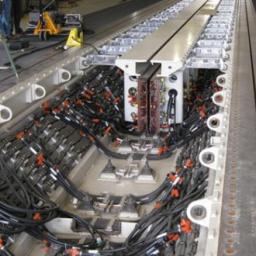The continent of Antarctica had its
hottest day ever in recorded history earlier this week, as temperatures soared to 63.5 degrees Fahrenheit (17.5 C) for the first time, eclipsing a record that's lasted over 50 years.
Base Esperanza, a research station run by Argentina situated on the northern tip of the Antarctic Peninsula, recorded the warm weather. The last time the region experienced such a high temperature was in April of 1961, when a high record of 62.7 degrees Fahrenheit was set at Base Marambio, another Argentinean base in the region. Scientists were particularly puzzled at the high temperature because it took place directly in the center of the autumn season for Antarctica. Base Esperanza typically experiences its hottest days in December with averages of around 37.8 degrees Fahrenheit. Normal March averages, in comparison, are closer to 31.1 degrees Fahrenheit (-0.5 C).
There have been several articles in the recent past about Rutan and his retirement project, a motorglider with the ability to take off and land on rough water, smooth water, snow, and unimproved fields. He has said the range will allow flight from California to Hawaii non-stop at 170 knots.
EAA has some info
here and
here.
Burt said in one article he plans to fly around the world with his wife in the new plane going places where no other plane can go. The design is said to be able to take off and land in just 400 feet allowing for some very out of the way spots to be visited.
This will be a bush plane with a 23 to 1 glide ratio, something unheard of in the aviation world before now.

Google and its partners are preparing
a flood of new hardware to sway consumers away from cheap Windows laptops. Chromebooks from HiSense and Haier go on sale today for just $150 each. You also might consider the Asus Chromebit that will cost less than $100. The Chromebit looks very similar to the Chromecast, but runs a full Chrome-OS instance, on-a-stick, ready to plug into any monitor. "Think of a school lab, all the peripherals, but stuck to a desktop. Now you can replace that."
The secret behind these low-cost devices is
the RK3288, a very inexpensive quad-core Cortex-A12 ARM architecture processor, which was launched in mid-2014 from Rockchip, a Chinese chip maker that's little known outside of industry circles. Because the chip can draw as little as 3 watts of power, the Chromebooks based on it are designed without fans, and can last all day on a single charge. You also get 2GB of storage, and a 16GB SSD in all 3 devices.
With fewer than 25 million Chromebook sales last year (opposed to more than 302 million PC sales), Google still has work to do. And thus today's announcement. Google and its partners are lowering prices further while chasing the one commodity laptop users value most: battery life.
I'm a stupid American. Even though many foreigners
may not speak English fluently, we force everyone to speak it anyway. In 1887,
Dr. Ludwig Lazarus Zamenhof constructed a neutral language using common root words from many different European languages. This universal language is much
easier to learn and shows less favoritism than picking an arbitrary natural language.
Therefore, all new stories and comments will now use
Esperanto. The one true international language!

For almost as long as aircraft carriers have existed, they've been equipped with steam-powered catapults to help fighters and bombers get airborne. That's a remarkably old-fashioned technology when you're launching stealth fighters that cost upwards of $20 million each. Aircraft carriers are gigantic, but the runways simply aren't long enough for most planes to generate sufficient lift under their own power.
The US Navy is now testing a replacement system called the
Electromagnetic Aircraft Launch System (EMALS) aboard the new USS Gerald R. Ford. It works by using an electric current to generate magnetic fields that propel a carriage down the track built into the runway, launching planes much more smoothly and efficiently than the old steam catapults with improved reliability. A steam catapult takes up a great deal of space and weigh in excess of 1,300 pounds. These systems take a long time to recharge after each launch, and the launch itself is rather abrupt. There's no smooth acceleration with a steam piston, resulting in increase wear on the body of the aircraft. Steam catapults also use more power than the EMALS system.
When submitting a story for a piece of news, which site do you link to? Depending on the popularity of the news, many dozens of organizations may have written an article on the topic. Some articles may lack proper grammar/citations or exist behind a paywall. Some sites may have abusive advertisements or frivolous JavaScript usage. You can exclusively use your favorite source, or link to several of the more popular news sites, or simply rely on the user to search for more information.
To help readers find more information, the site will now include a "Similar" button at the bottom right of the story box. Clicking on the link will show you a list of similar news articles to current topic.
Eagle-eyed viewers may have also noticed a new "Inline Reply" option in their profile settings. After a few weeks of limited roll-out, this option is now enabled by default for logged in users. Of course, you should have JavaScript enabled to use this new feature.
Smartphone thefts are
down 40% in London, 22% in San Francisco and 16% in New York, while iPhone thefts are down even further, since the implementation of "kill switches," which allow owners to completely deactivate a phone that has been lost, making a stolen device worthless.
Major smartphone companies were reluctant. Gascon said he had met with Apple executives and been "rebuffed." Frankly, the carriers don't gain anything from this service, and
actually add customers when someone signs up with them using a stolen phone. As for the phone companies, every stolen phone is a potential new sale. Companies would never want to admit that stolen phones are good for their bottom line, but they don't have any good excuse for why they wouldn't voluntarily implement something. They only said that a kill switch had serious risks, including vulnerability to hackers who could disable others' phones. Meanwhile, Australian phone carriers have been doing it successfully since 2003.
"The significant decrease in smartphone thefts since the implementation of kill-switch technology is no coincidence," New York Police Commissioner William Bratton said in the press release. "Restricting the marketability of stolen cell phones and electronic devices has a direct correlation to a reduction of associated crimes and violence." Soon, all smartphones in the United States will have these features, as a California law passed in August will require all smartphones sold in the state to include kill switch technology, effectively requiring manufacturers to include the feature on all smartphones.
Scientists at the University of Florida have confirmed the Asian and Formosan subterranean termites - both formidable non-native species - are mating in south Florida. The offspring of these species thrive by combining the
strongest qualities of their parents. The two species are considered particularly damaging and difficult to control, since they travel underground and burrow up through buildings. What sort of termite do they produce? The bad news is that based on lab results, the hybrid colonies appear to grow faster than those of either species that produced them.
"The combination of genes between the two species results in highly vigorous hybridized colonies that can develop twice as fast as the two parental species," said Thomas Chouvenc, research assistant at the University of Florida's Subterranean Termite laboratory. "The establishment of hybrid termite populations is expected to result in dramatically increased damage to structures in the near future."
The annual cost of termite damage and control measures in the U.S. is estimated at $5 billion.
An easier to squeeze mayonnaise bottle might be
coming out this year, and easier to squeeze toothpaste could be here in 2017. This is thanks to a liquid-impregnated coating called LiquiGlide that can keep the inside of a container permanently wet and allow its contents to easily slide out. Elmers Products, Inc. is on board, too, and has already signed a contract with LiquiGlide to let you get every drop of glue out of the bottle. Follow the link for videos of the coating in action.
LiquiGlide is a liquid coating that binds much more strongly to textured surfaces than to liquids, so when it's painted onto the inside of a container, the liquid can flow freely over it without creating friction and viscosity. It was originally created in 2012 by a professor, Kripa Varanasi and his grad students at MIT. They've formed their own LiquiGlide company, and it's now getting some traction among consumer products. However, the original intent behind LiquiGlide was not to make it easier to have ketchup with your fries. Varanasi was thinking about industry applications like more efficient oil pumping. For now, the company has found success in consumer products, but it will continue pursuing industry application ideas too.

